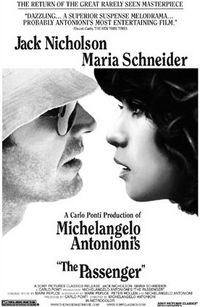 As Omar pointed out last week when writing about Fellini's Roma, they don't make them like this any more. Antonioni in retrospect is probably, together with Ingmar Bergman and Alain Resnais, one of the few directors who has ever radically attempted to put an idea into film. It is probably also the foremost reason why he has always been considered too intellectual, even boring. True, as David Cook points out in his History of Narrative Film, his treatment of subject matter (in this case the question: what is identity?) is indeed virtually touching on the inhumane. It is as if the actors are no more than substrates for the concepts he is trying to introduce. And it is of course equally true that such treatment of actors and action is by most people not considered to be the ultimate goal of a movie.
As Omar pointed out last week when writing about Fellini's Roma, they don't make them like this any more. Antonioni in retrospect is probably, together with Ingmar Bergman and Alain Resnais, one of the few directors who has ever radically attempted to put an idea into film. It is probably also the foremost reason why he has always been considered too intellectual, even boring. True, as David Cook points out in his History of Narrative Film, his treatment of subject matter (in this case the question: what is identity?) is indeed virtually touching on the inhumane. It is as if the actors are no more than substrates for the concepts he is trying to introduce. And it is of course equally true that such treatment of actors and action is by most people not considered to be the ultimate goal of a movie.But then one would pass over the fact that art since the advent of modernism no longer has the duty to please. No, art has the duty to put relevant political questions on the table, a duty most artists seem to have forgotten all about in a time when words like 'idea' and 'intellectual' are thought of as cusswords and entertainment has taken the place of art, up to the point that most people have forgotten what the attributes of true art are. More to the point, art has to raise more questions than it is able to answer. Art is supposed to be an endless generator of ideas, so that, when the artwork is put outside of its original context, it continues to disseminate meaning.
That is the reason why Antonioni's movies are pure art, almost unto the brink of total detachment. Seldom before have I watched a movie that contains so much emblematic dialogue. Where in other movies conversations mostly follow the logic of the action, in The Passenger they follow the logic of ideas. In this movie you are not one moment tempted to view Nicolson as "that actor from Five Easy Pieces or The Shining". Rather he becomes a vehicle for Antonioni's filmic statements about loss of identity, alienation and the inability of communication. It comes as no surprise then that, at the end, although surrounded by people he loves (or pursued by those he used to love), he dies alone.

2 comments:
art has to raise more questions than it is able to answer
He was the master of this. What I just don't get is why his 60s movies aren't available on European DVD's. I really need to see La Notte again.
You know what the question of why criticism and subversion are lacking in current art productions, is plaguing me not only in my role of the cultural parodist, but also in my original role of the artist. I feel so discouraged by the fact that when I try to make something ''engaged'', nobody understands, and nobody wants to watch.
The absence of critical distance is the common denominator of all modern Western art. I was just thinking in relation to BABEL by Irritantu how the film only offers a timid, subdued sort of criticism, makes absolutely no radical moves and in the end concedes to the global United Nations ''love the world'' pamphletism, which means absolutely nothing, which can be consumed like Cola Light.
I am especially shocked by the fact that this is (also) happening in Holland; in better times this country used to be the European leader in subversion, liberalism, anarchism, avantgardism.
Even worse, I am continuously depressed by the fact that some revolutionary ideas of the period, such as the sex revolution, only resulted in today's chronic depression.
In this sense Antonioni's alienation seems to me more than just a little bit visionary!
Post a Comment